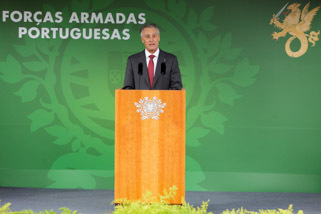

Mister Speaker
Excellency,
Having received, to be enacted, Parliamentary Decree No. 280/X, which approves the Law on pluralism and non concentration of the media, I have decided, in the terms of Article No. 136 of the Constitution, not to enact it based upon the following precepts:
1- In the message I sent to Parliament with respect to the non enactment of Decree No. 265/X, I made reference to the freedom of the press, as well as to the freedom of expression and information, consecrated in Article No. 37 of the Constitution, as fundamental values of democratic Rule of Law. I equally referred to the role attributed to the State in ensuring the freedom and the independence of the media and the prevention of its concentration, in the terms of No. 4 of Article No. 38 of the Constitution. I thus did not query “the approval of measures conducing towards guaranteeing the pluralism of the media and preventing that its concentration could, as an extreme, become a threat to the freedom of the press and of information”.
2- However, Parliament has again sent me a decree in respect of this issue, following the reappreciation of Parliamentary Decree No. 265/X, and it seems that both the substance of the law and the political conditions for its approval remain essentially the same.
3- I had the occasion to emphasize the relevance I attribute to political and legislative practices that endeavour to find wide parliamentary consensus in issues regarding freedom of information. The constitutional treatment of this matter, as specifically expressed in the demand for qualified majorities in legislation such as that in respect of the body which regulates the media, widely shows the theme’s specificity.
4- Such political and legislative practices are justified by the knowledge that, when legislating on the regulation of the media, the “rules of the game” are effectively being determined. It is well known that the founding nature of plural democracies derives from the establishment of commitments which determine the rules ensuring its functional operation, such as in the case of freedom of information and media regulation. Moreover, in the generalized parliamentary debate over the Legislative Proposal which would set up the Media Regulatory Body (ERC), the relevance of a wide inter-party consensus over the issue of media regulation was highlighted several times. It was for this reason that, in the message addressed to Parliament on 2 March 2009, I made known my belief that an “additional effort” was justified in order to obtain a “plural and inter-party consensus”. This has, once again, not been the case, in spite of the current legislature coming to an end a few months hence, which would advise that special regard be given to issues particularly relevant to the quality of our pluralistic democracy and for the safeguard of the Rule of Law.
5- It appears that, in spite of the approval of several changes, both as to form and as to detail, the bases which justified my reservations in respect of some of the rules of Decree No. 265/X continue as before.
6- The mere replacement of the expression “rating tools recognized by the industry” by “measuring tools used in the industry” does not resolve the issues raised in articles Nos. 20 and 21, relative to the conditions underlying the start of an administrative inquiry into the powers that influence public opinion. Since the criteria relative to audience limitations from which an administrative inquiry should be started are essentially maintained, and without greater consistency of the concepts expressed in these articles, the objections, either in respect of the reliability of the rating and of the public scrutiny of ERC’s power to take decisions, are equally maintained.
7- Equally, the change made to Article No. 13 of the law does not reflect the necessary consideration of the effect of restricting the access to media activities by public bodies. Moreover, this rule was formally reformulated, but no change was made as to its content or its range. As I highlighted in the message relating to Decree No. 265/X, “I have always maintained that companies in this industry must, as a rule, be private enterprises”. It should be noted, however, that the restriction of access, as foreseen in Article No. 13, to the development of activities by the State and other public bodies in the sphere of the media may constitute a limitation to the public sector, and it is not known if, under certain circumstances, this could not “place at issue the pursuit of relevant public interests, including pluralism itself and the independence of the media”, as I referred in the message relative to Decree No. 265/X.
For these reasons I have decided, in the terms of Article No. 136 of the Constitution, not to enact Parliamentary Decree No. 280/X.
With highest regards,
Palace of Belém, 20 May 2009
THE PRESIDENT OF THE REPUBLIC
Aníbal Cavaco Silva
© 2006-2016 Presidency of the Portuguese Republic
You have gained access to the records of the Official Site of the Presidency of the Republic from 9 March 2006 to 9 March 2016.
The contents available here were entered in the site during the 10 year period covering the two mandates of President of the Republic Aníbal Cavaco Silva.